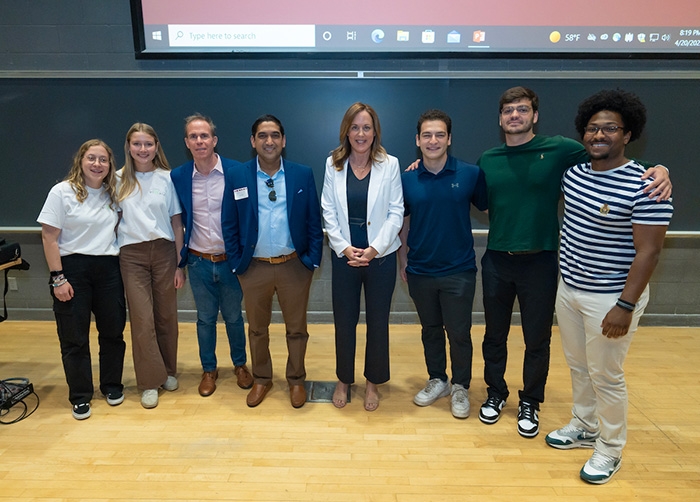Now the real competition begins.
The presentations by two teams of students at Union’s second annual business competition Thursday night were so strong, judges decided to give each an equal share of the prize money for now, with the remainder to be awarded at a later date to the venture that shows further progress.
Four teams of students had five minutes each to pitch their idea to a panel of alumni judges in Olin Auditorium for a chance to win $15,000 in startup capital. The prize money is a gift from an anonymous donor.
Representing a diverse mix of majors, the students were part of SparkLab, an entrepreneurial initiative created last year by Roger Woolsey, executive director of the Career Center at Becker Hall. Forty-four students, up from 33 in the first year, met every Tuesday during the winter term to learn basic business principles from accomplished alumni. Topics included marketing, sales, fundraising and technology.
Students also learned how to create a pitch deck - a 10-12 slide presentation that provides a short summary of a company, its business plan and the startup vision - to attract potential investors.
eLEVate, founded by mechanical engineering majors Anna Hoffman ’23 and Emily Abruzzese ‘23, would provide a cheaper and more sustainable alternative to buying a new electric vehicle through electric vehicle conversions. The company aims to take more internal combustion engines off the road, recycle previously manufactured vehicles and target lower-income communities that do not have access to new electric vehicles.
Flicc, founded by Jonathan Anderson ’25, a psychology major, Anthony Condemi ’25, a chemistry major, and Max Gluck ’25, a managerial economics major, would empower community building through a social media photo sharing app that encourages users to “be who you are, where you are.”
Both teams outlined its vision for the startups in impressive fashion, leaving the judges to award $5,000 to each. The remaining $5,000 will be given to the team that advances its idea by the time the parties reconvene via Zoom in September.
“This was a very difficult decision,” said Catharine Potvin ’97, founder and CEO of Stragility. She judged the competition along with Bobby Syed ’03, COO of iSimulate and Tony Versaci ’91, managing director of product strategy for Versana.
Hoffman was grateful to share in the award.
“This is going to encourage us to work really hard for the next $5,000,” she said, “as well as propel us to secure more funding for our idea.”
Condemi said the next step would be to get in touch with some development companies to keep pushing their plan. The hope is to have something ready by Homecoming. He didn’t mind sharing the award for the time being.
“The women from eLEVate made a great pitch,” said Condemi, who, like his co-founders, is a member of Union’s football team. “We love their idea and are happy to compete with them for the remaining money.”
Other competitors included Tocontacts.me, founded by Andrew Lavin ‘25, an economics major. The venture is a business card that will “give you the confidence to connect while networking”; and 1Step, a fitness app that uses personalized training advice to encourage users while also connecting them to communities of individuals pursuing similar goals. It was founded by Duncan Dener ‘25, a managerial economics major, and Ryan Parsons ’26, a liberal arts major, and Aidin Briney ’23, a history major.
“The students in this program don’t do this for a grade or credit,” said Woolsey. “They do it because they believe in something. That is very, very powerful.”
